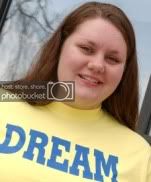( – promoted by navajo)
 On June 27, 2002, the US Supreme Court rendered a verdict on a case brought by Lindsay Earls, a member of the Cherokee Nation, whom I refer to as a great American heroine. Even though she is an Oklahoma resident, her case received a great deal of coverage in my region (Vermont/New Hampshire border) as she was by then a student at Dartmouth College (whose medical center I am employed at).
On June 27, 2002, the US Supreme Court rendered a verdict on a case brought by Lindsay Earls, a member of the Cherokee Nation, whom I refer to as a great American heroine. Even though she is an Oklahoma resident, her case received a great deal of coverage in my region (Vermont/New Hampshire border) as she was by then a student at Dartmouth College (whose medical center I am employed at).
I wrote about this several years ago; alas, several links which I cite here no longer work. But here first is her story of courage, followed by what she is doing today.
In 1999, Lindsay Earls was a 16 year-old junior at Tecumseh High School (about 40 miles southeast of Oklahoma City) and was a self-described “goody two-shoes”; being a member of an academic quiz team and a choir singer. One day she was called out of choir practice to submit to a random urine test for drugs; based on a 1998 school board policy that required all students in grades 7 – 12 to submit to a urine test before joining any extracurricular activities.
In order to preserve her right to participate, she complied with the drug testing (and always passed) but filed a lawsuit claiming that the policy violated the Fourth Amendment’s prohibition against unreasonable search/seizure. Her position was denied by the district court, then supported by the Tenth Circuit Court of Appeals and then reached the US Supreme Court in March, 2002.
Lindsay Earls had reason for hope, since the most relevant Supreme Court precedent had to do with a 1995 case called Vernonia School District vs. Acton. This involved a school district that had experienced problems with drugs (performance-enhancing in addition to recreational use, if I recall correctly) on its athletic teams. It instituted a policy that called for random drug-testing of student-athletes only (due to the danger involved in contact sports). Though I regret anytime that we move away from probable cause to guilty-until-proven-innocent: that ruling at least seemed to have been decided judiciously.
By contrast, the Tecumseh policy was not based on a response to drug usage among students involved in extra-curricular activities, and it applied to members of, say, the debate team as well.
Lindsay Earls endured some rather snide remarks from people in her home state who trotted out the old police-state-like “if you have nothing to hide…..” argument, despite her passing the test. Particularly telling was this quote from someone in Congress:
Indiana Rep. Mark Souder (R) said the court’s ruling should drive an expansion of testing nationwide and will not hurt the privacy of students. The testing “is only burdensome on those who want to waste their lives getting high,” he said.
Yes ….. that Mark Souder …. he of marital infidelity fame .. infamy.

She also had to endure this from Justice Anthony Kennedy whom I regarded as a genuine hero himself in “Lawrence vs. Texas”:
Justice Anthony Kennedy drew gasps from the courtroom audience when he appeared to personally attack plaintiff Lindsay Earls. Kennedy posed a hypothetical with one school that had drug testing and one that did not — “the druggie school,” he called it. “Every parent” would want to send his children to the first school”, Kennedy told plaintiff’s attorney Graham Boyd of the ACLU’s Drug Policy Litigation Project, but then added dismissively, “Well, perhaps not your client”.
On that fateful day of June 27, 2002, the US Supreme Court overturned the Court of Appeals case and ruled against Lindsay Earls by a 5-4 margin. This ruling sadly seemed to up-the-ante for the guilty-until-proven-innocent standard, as the court seemed to dismiss the fact that the high school in question had no history of drug use among those involved in extra-curricular activities, and now stretched hard to say that anyone who did participate had no right to expect privacy.
One wonders if a future court will take the next logical step and endorse testing for all students (on a loco-parentis basis). Paul Clement – then the deputy solicitor general for the Bush administration – felt school-wide drug testing would be constitutional and has said so in court. Yet as a commentator for the Daily Texan noted at the time (sadly which is no longer on-line), “But obviously he’ll settle for extracurricular activities now, since it makes for an easier case“.
If there are saving graces to this story (besides the courage of this young woman) it would be:
(a) Many school districts have not adopted these policies – some doubt their effectiveness, while the majority have decided the cost to be too much. And perhaps in part because …..
(b) Those authorities realize that a 5-4 majority may fall some day; perhaps a future justice may echo the words of Justice Kennedy when he famously declared that the precedent that he voted to overturn in Lawrence vs. Texas was, “wrongly decided then, and it is still wrong“, and
(c) Some conservatives felt uncomfortable by the decision, also – consider these words from Debra Saunders – first written in a Town Hall(!) column entitled “Want to join the chess club? Pee In a Cup”:
Liberals and conservatives should be outraged at last week’s U.S. Supreme Court ruling in favor of an Oklahoma school district’s mandatory drug testing policy for students involved in extracurricular activities. That 5-to-4 decision, written by Justice Clarence Thomas, was an assault on parental rights. Since drugs were involved, the justices felt free to indulge in judicial activism — something conservatives such as Thomas are supposed to abhor.
Finally, this story has a happy ending in that Lindsay Earls not only is a 2005 graduate of Dartmouth College, but for a few years held a position of responsibility at the Indigenous Democratic Network (as she no longer works there, this is no longer on-line):
Lindsay Earls, a member of the Cherokee Nation of Oklahoma, hails from Tecumseh, Oklahoma. While at Dartmouth, Lindsay was active in Dartmouth Civil Liberties Union and in DREAM – a Vermont-based mentoring program. Lindsay has been a recipient of the ACLU’s Youth Activism Award and the New Hampshire Civil Liberties Union’s Bill of Rights Award.
Currently she is a law student at the University of Tulsa, and this past spring gave an address sponsored by the Oklahoma ACLU on her case.
I was originally tempted to entitle this essay (Native) American heroine …. but upon reflection, I think I have the title just as it should be.

“We should pay attention to that man behind the curtain.”
Thanks Lindsay for your courage, intelligence and downright stamina. I’m full of admiration.
nine_bear